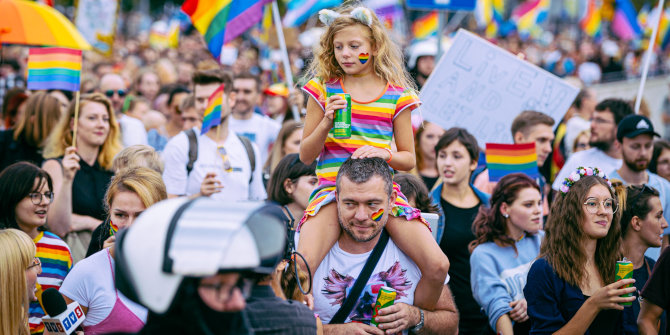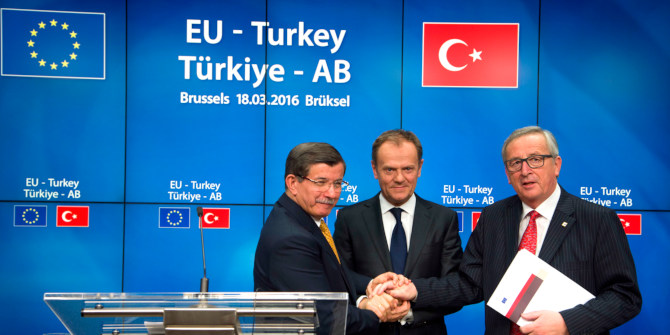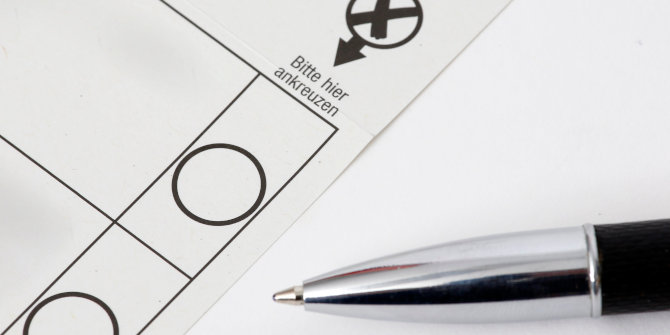 LGBT rights have played a prominent role in the run-up to Poland’s election on 13 October. Lukasz Szulc writes that the ruling Law and Justice party has attempted to shore up its support by taking a harsh line on the issue, and while LGBT rights will probably not stay high on the party’s agenda after the election, it will take a long time to reverse the negative effects for Poland’s LGBT citizens.
LGBT rights have played a prominent role in the run-up to Poland’s election on 13 October. Lukasz Szulc writes that the ruling Law and Justice party has attempted to shore up its support by taking a harsh line on the issue, and while LGBT rights will probably not stay high on the party’s agenda after the election, it will take a long time to reverse the negative effects for Poland’s LGBT citizens.
Picking a vulnerable group of people, demonising them and convincing your voters that you will protect them from the threat the group allegedly poses has long been a proven strategy for electoral success. This, at least, seems to be the golden rule for the currently in power conservative and populist Law and Justice (PiS) party in Poland.
Ahead of the 2015 parliamentary elections, PiS – then in opposition – focused on refugees. At a time when thousands of people were dying in the Mediterranean Sea and European Union members were trying to respond with a common policy, the party leader, Jarosław Kaczyński, was citing alleged diseases and parasites that Middle Eastern refugees could bring to Poland. Four years later, in the run-up to the parliamentary elections scheduled for 13 October this year, Law and Justice are employing similar tactics with respect to LGBT rights.
A Polish independent media outlet, OKO.press, has gathered 33 quotes by PiS politicians expressing anti-LGBT sentiments. Mr Kaczyński, for example, warned in March this year that LGBTs aim to legalise the adoption of children by same-sex couples, to which he exclaimed ‘Stay away from our children!’ Mateusz Morawiecki, the current Prime Minister, in turn compared in June 2019 the defence of heterosexual marriage as enshrined in the Polish Constitution to ‘the battle of Salamis’, suggesting that ‘defending’ the heterosexist definition of marriage is akin to defending the very essence of democracy.
Why LGBTs and why now?
Even though LGBT issues were previously not high on the party’s agenda, PiS has a long-standing record of anti-LGBT discrimination. One of the recent key turning points has been the rise of a transnational movement against the so-called ‘gender ideology’, a flexible term, which in Poland is most often associated with such issues as abortion rights, sex education, reproductive technologies as well as feminist and LGBT activism. In January 2014, a number of conservative politicians established a parliamentary group ‘Stop Gender Ideology’, with the main aim being to defend ‘traditional family’ and children.
After their win in the 2015 elections, PiS and politicians associated with the party continued their anti-feminist and anti-LGBT politics. The first decision of the current President of Poland, Andrzej Duda, after he took up the post in 2015, was to veto the Gender Accordance Act, which would allow transgender people to change their legal gender without the approval of their parents. In 2016, PiS reduced the budget of the Polish Ombudsman, arguing that ‘the Parliament is not going to pay for gender’, and in 2018, the party attempted to tighten the country’s abortion laws, which are already among the most restrictive in Europe.
This year, however, PiS has specifically targeted LGBTs. The triggering event was the signing of ‘The LGBT+ Declaration’ in February by the Mayor of Warsaw, Rafał Trzaskowski, who belongs to the main opposition party, Civic Platform (PO). The document was based in part on consultations with Polish LGBT organisations and was designed to fight against anti-LGBT discrimination. PiS protested against it because it includes sex education guidelines compiled by the World Health Organisation, which some of the party’s members, including Mr Kaczyński, interpreted as the ‘sexualisation of children’. This builds on an old stereotype which conflates homosexuality with paedophilia and portrays contemporary LGBT identities and activism as a foreign, specifically western, import. In the process, a vague ‘gender ideology’ has been turned into a more specific ‘LGBT ideology’, the phrase which has recently become more common among PiS politicians.

Credit: Max Bashyrov (CC BY-NC 2.0)
PiS is not alone in its treatment of LGBTs. It has found allies in the public media, now fully controlled by PiS: every week, the main news programme, Wiadomości, has at least one mention of LGBTs, always in a negative context, in which they are viewed as ‘sexualising’ children, attacking ‘traditional family values’, disrespecting the Roman Catholic Church or demanding ‘special rights’ and ‘privileges’.
This, however, is still relatively mild compared to the pro-government right-wing media. The conservative newspaper Gazeta Polska issued in July this year the infamous ‘LGBT-free zone’ stickers, encouraging its readers to spontaneously use them to mark places where LGBTs are not welcome. The newspaper is a private business but receives significant advertisement placements from state-run companies. The stickers have been banned from sale by a Polish court.
And there is also the Roman Catholic Church with some prominent bishops vigorously demonising LGBTs. A recent example was the Archbishop of Kraków, Marek Jędraszewski, who called LGBTs a ‘rainbow plague’. Speaking during the ceremony commemorating the 75th anniversary of the Warsaw Uprising, he explained that while Poland is no longer affected by the ‘red plague’ (a reference to communism), there is a new plague, which is ‘not Marxist, Bolshevik but born of the same spirit, neo-Marxist. Not red but rainbow’.
What’s next?
Centring the election campaign on LGBT issues has resulted in the mobilisation of both hate and solidarity. The former is epitomised by the reactions to the first Equality March organised in Białystok in the summer, where the participants were violently attacked by the far right. The latter is best illustrated by a spontaneous Twitter action #JestemLGBT (#IamLGBT), during which hundreds of thousands of people came out publicly by posting selfies. They showed that the so-called ‘LGBT ideology’ is not about sexualising children nor about threatening families. LGBTs are not the paedophiles, communists or ‘homo lobbyists’ PiS want them to be but real, often ordinary, people.
It is very likely that PiS will win the October election, though it is less likely that the party will secure a majority of seats in the parliament, as it did four years ago. LGBT issues will probably not stay high on the party’s agenda after the elections. The harm, however, has been done and it will take a long time to reverse the negative effects. Besides, other elections will come where the party may choose to pick on yet another vulnerable group. Taking on the role of the country’s most powerful bully seems like an easier campaign choice for PiS than offering solutions to the systematic problems confronting Poland.
Please read our comments policy before commenting.
Note: This article gives the views of the author, not the position of EUROPP – European Politics and Policy or the London School of Economics.
_________________________________
 Lukasz Szulc – University of Sheffield
Lukasz Szulc – University of Sheffield
Lukasz Szulc is a Lecturer in Digital Media and Society at the University of Sheffield and co-chair of LGBTQ Studies Interest Group in the International Communication Association. His interests include cultural and critical studies of media and identity at the intersections of gender, sexuality and transnationalism. He has recently completed his EU Marie Curie Individual Fellowship at LSE, which focused on identity management on social media by LGBTQ migrants. Lukasz is the author of Transnational Homosexuals in Communist Poland: Cross-Border Flows in Gay and Lesbian Magazines (2018, Palgrave) and co-editor of LGBTQs, Media and Culture in Europe (2017, Routledge). He has also published articles in journals such as Communication Theory, New Media & Society, and Social Media + Society. He tweets @LukaszSzulc






Good overview. After listening to some of his speeches, I think that what Kaczyński means by “LGBT ideology” and “gender ideology” is pretty clear. Under the LGBT label he identifies civil unions, gay marriage and adoption of children by gays. Under “gender” he is talking about non-binary gender expression, with sex education thrown in. Abortion and in-vitro in some ways are separate issues in the PiS scheme. The majority anti-Francis reactionary wing of the Polish Bishops’ Conference has come out vociferously in support of Kaczynski’s anti-LGBT and anti-gender gambit.
I agree that after the election PiS is likely to quietly forget about it all, but on the other hand the Polish Church (in my view no longer truly Catholic) will probably take much credit for a PiS victory and will be expecting a reward in the form of complete bans on abortion and in-vitro, as well as more money. However, Kaczyński is too canny an operator to let himself be boxed in by a compromised Church, and no doubt he understands the latent anti-clericalism in a rapidly secularising society. He also must know how suspicious is his own position as a bachelor who lived with his mother until her death a few years ago. His cats keep him company now.